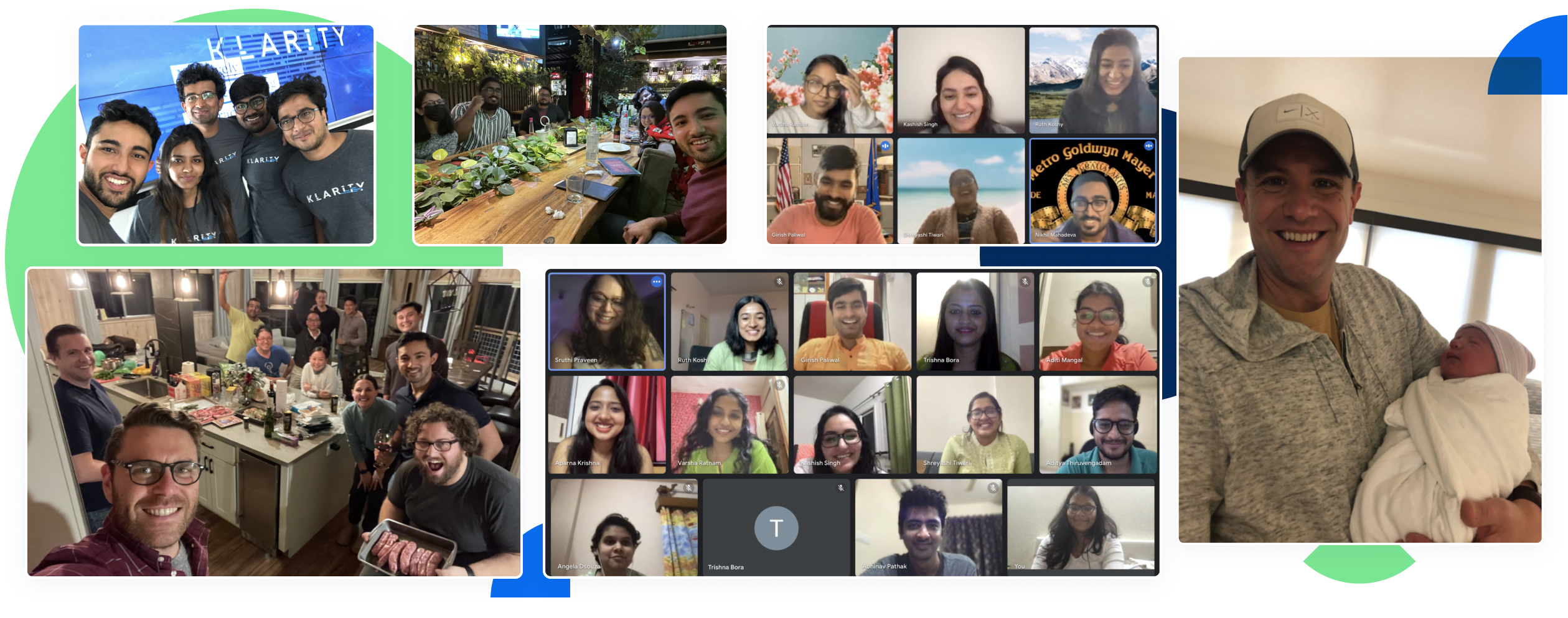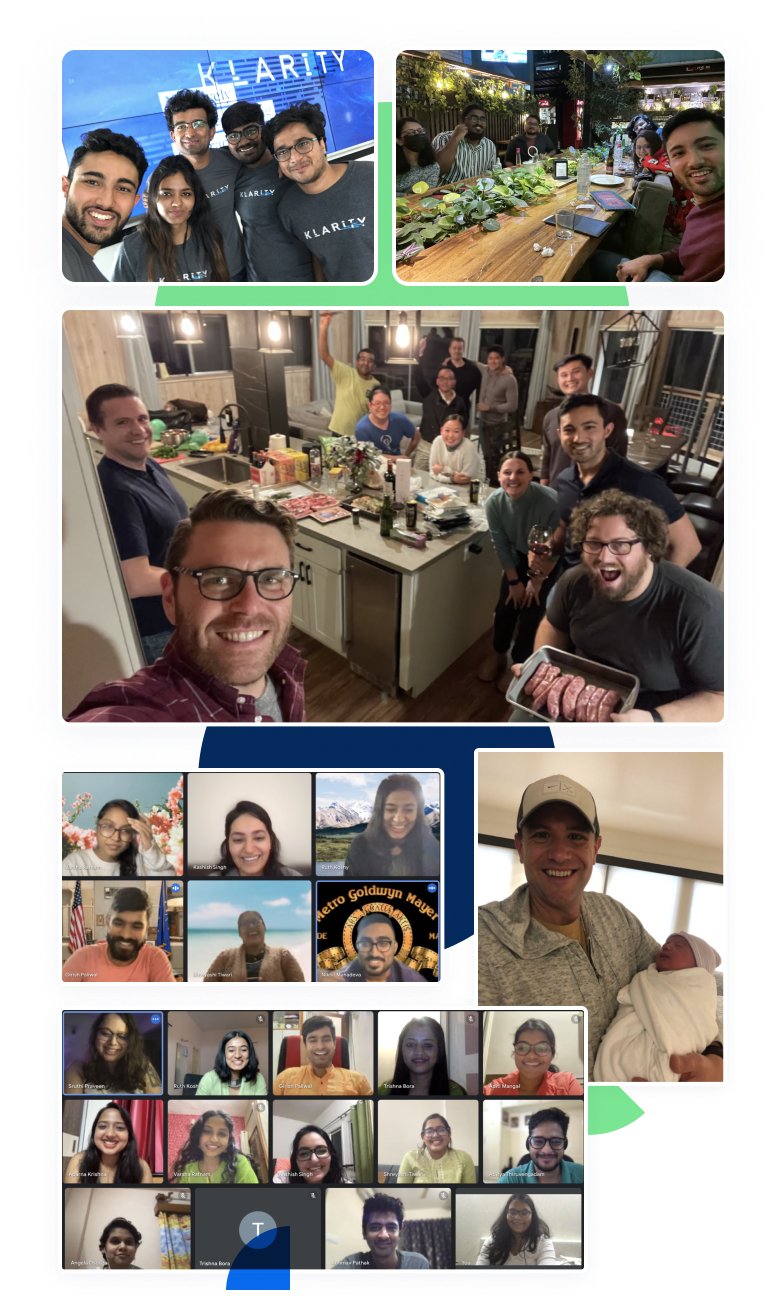What role will
Generative AI
play in the future of accounting?
What role will
Generative AI
play in the future of accounting?
What role will
Generative AI
play in the future of accounting?
Don't have time now? Download it.
Why customers choose Klarity
Thank you to all the attendees, partners, and speakers who came out to Klarity’s first-ever Generative AI: Future of Accounting Summit on Wednesday May 24th in San Jose. It was a full day exploring the early impact of generative AI within our industry and what the future may hold.

We heard keynote presentations from Klarity’s founders: Andrew Antos and Nischal Nadhamuni; a fireside chat from Google’s VP of Finance Systems, Jannie Affeld; and roundtable discussions from industry leaders including Amplitude, Genesys Cloud, Benchling, Crowdstrike, Zuora, Accenture, and OpenAI.
A very special thanks, as well, to our sponsors: Zuora and 8x8!
Nearly 75 finance and accounting professionals joined Wednesday’s summit. The energy and engagement from all who attended was electrifying! One point of consensus was clear – manual processes long inherent to accounting can achieve superior accounting automation with generative AI infused into their workflows.

If you were there for part of the day, the full experience, or could not make it at all, then here are three more takeaways to reflect on...
75% of work within a revenue accountant’s scope could be automated with AI

Klarity’s CEO, Andrew, shared this stat and slide during his keynote address. This table shows key job responsibilities of a revenue accountant and which task can be completed by a human or AI. Recent developments in AI technology now enables users to automate repetitive and manual tasks. You may have heard this from your boss before: If you have to do it more than once, build a process for it. In this case, use AI to automate scalable tasks to free up your time and effort. Think of generative AI as a tool designed to enable you to do more with less hassle.
Individuals are already using GenAI to automate repetitive and scalable tasks like helping to create initial draft memos

Nearly every hand in the room went up when Jake Nibley, VP of Tola Capital, asked, “Who here has used ChatGPT before?” during our Managing GenAI Workflows and Programs panel discussion. This tracks against larger trends, too. According to Accenture, 98% of global executives agree AI foundation models (aka generative AI) will play an important role in their organizations’ strategies in the next 3-5 years.
ChatGPT, Google Bard, and Mosaic are all types of generative AI – powerful technology designed to help simplify tasks like summarizing an ASC-606 accounting memo. If the future of work means more generative AI applications, then it’s fair to assume everyone wants to become adept at using generative AI right now. As Klarity’s CTO, NIschal, alluded to in his keynote: Nobody wants to end up like Sears.
Executive leaders want to know how to implement AI thoughtfully within their organizations.

With any tool or technology, there are potential limitations to consider when using it. Generative AI is no different. Klarity’s CTO, Nischal, took a moment during his keynote to discuss the unintended implications of generative AI including biased results and data privacy issues. This is why responsible AI initiatives, like the Biden-Harris administration announcing last month new policies to promote ethical AI innovation, are emerging in our communities.
Organizations who intend to adopt GenAI into their business strategies can’t do so without leadership involvement. You must lead with your organizational mission, pursue rapid experimentations with GenAI across different team processes, and foster a collaborative environment for all to play a part in it. As we’ve learned from our own experiences in building generative AI into Klarity 2.0, it takes a village to implement AI thoughtfully within your enterprise.
In closing…
Generative AI will continue to influence our industry as we know it today. This will require a collective effort from individuals and organizations alike to decide what that future will look like. There’s much to uncover how accounting teams can continue to unlock more operational efficiency and garner greater job satisfaction with generative AI. It’s a journey we, at Klarity, are excited to walk with you.

Can’t get enough of generative AI and accounting?
We’d love to hear from you! Fill out this brief 6-question survey on your experience using generative AI. It takes no more than one minute. We will share the results in a future blog.
The Klarity team is excited to announce the second edition of Generative AI: The Future of Accounting Summit in San Francisco, California. Visit our event page below for more details and to reserve your seat.
- Wednesday September 20th - Generative AI: The Future of Accounting Summit
Why Customers Love It
“We are extremely excited to implement this Generative AI Technology for our customers. Klarity Architect demonstrates the superior analysis capabilities of AI using Multi Modal analysis and LLMs in real life scenarios. We believe in the impactful transformative value of AI and look forward to delivering tangible results to our customers by utilizing Klarity Architect.”
— Ahmed Zaidi, CEO, Accelirate
Find out how Accelirate cut documentation time by 67% and scaled their operations →
Life at Klarity


.gif)


